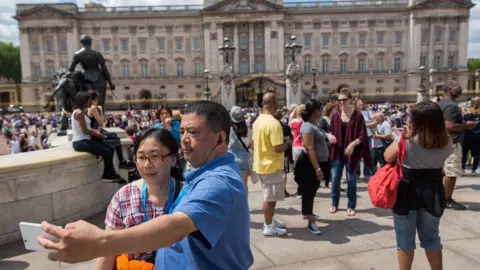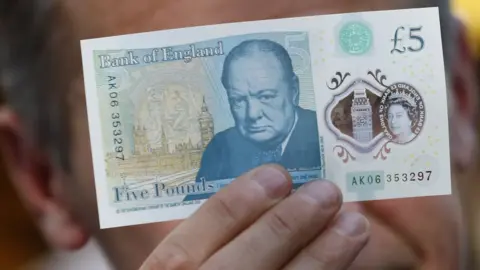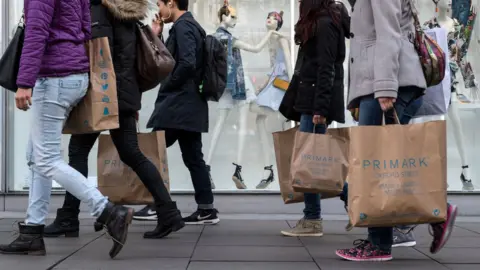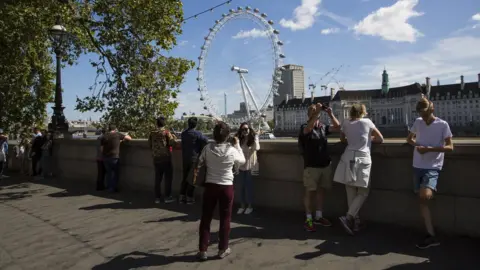UK tourism sector booms as sterling falls
 Getty Images
Getty ImagesTourism has been one of the most successful parts of the UK economy recently, thanks in part to Brexit.
The weaker value of the pound since the Brexit referendum vote means that the UK is now a much cheaper destination than it used to be.
Many mainland Europeans, Americans and Chinese people are taking advantage of that.
That's clear from the cacophony of different languages and accents outside Buckingham Palace, and on the streets around the Palace of Westminster.
"It's a little more economical than it was a few years ago," says one visiting American tourist.
"Thanks to the euro, London is not more expensive than in France," a French tourist adds.
Meanwhile, a German man said the euro-pound rate has "made me quite happy".
 Getty Images
Getty ImagesTwo-thirds of the international visitors enjoying London's sites, Cornwall's beaches and Edinburgh's Royal Mile are from the rest of the European Union.
The tourism agency VisitBritain forecasts there'll be a 6% rise in the number of international visitors in 2017, with large numbers coming from France in particular.
VisitBritain's director Patricia Yates says: "The currency is in our favour. It might motivate more people to come."
Numbers game
The tourism boom was helped by the Olympics in 2012, a showcase for Britain's historic towns, picturesque villages, and stunning national parks.
The latest data from Forward Keys, which monitors flight bookings, suggests international arrivals to the UK will be 9% higher for August to October this year compared to the same period of 2016.
 Getty Images
Getty ImagesBookings from China are up 20%, and those from the US are 23% higher, the data suggest.
There aren't just more tourists, they're also spending more when they're in the UK.
VisitBritain predicts tourists' spending will surge by 14% this year.
"Very often people budget in their own currency. They're getting more pounds for their money, and we can see their spend going up," says Patricia Yates.
Sterling has tumbled 16% against the euro since the June 2016 referendum, and has fallen 23% against the US dollar.
Over the past two years, the pound has dropped about 30% against the euro.
"There are some factors putting downward pressure on the pound, and some other things putting upward pressure on the euro," says Paul Hollingsworth of Capital Economics.
 Getty Images
Getty ImagesHe lists the downward forces on sterling as "Brexit and uncertainty about the UK's future relationship with the EU, the economy... and the expectation for interest rates".
"We've seen quite a Brexit bounce," says Jace Tyrrell from the New West End Company, which represents shops on London's Bond, Oxford and Regent Streets.
As shoppers carrying bags from all sort of stores rush by on Regent Street, Mr Tyrrell says, "In the past six months, there's been a 36% increase in spend here, so certainly international visitors are appreciating the value depreciation".
Stores report sales of pricey jewellery and high fashion items have been rising the most.
'Golden age'
The large American hotel chain, Hilton, has 138 hotels in the UK, and is planning to open 30 more, partly because of the tourism boost spurred by the fall in sterling.
The company says it has seen double-digit growth in the UK over the past year.
 Getty Images
Getty ImagesIn the lobby of one of its swanky London hotels, Simon Vincent, Hilton's president of Europe, the Middle East and Africa, says we're living through a "golden age of travel".
Another factor behind the company's British expansion is demand from UK customers, as "staycation" becomes more popular.
"The domestic customer has always been an important part of our business mix, particularly in our portfolio outside of London," says Mr Vincent.
"In fact, it's the most significant proportion of our business. It's been growing well."
Bargain basement Britain?
Despite "Brexit bounce", the sharp increase in tourist numbers began before the sharp drop in the pound, and the industry says it isn't relying on currency depreciation to increase numbers further.
"We operate in a competitive global environment," says VisitBritain's Patricia Yates.
"We will never be a cheap destination, we don't want to be. We have to offer good value for the prices we're charging," she says.
